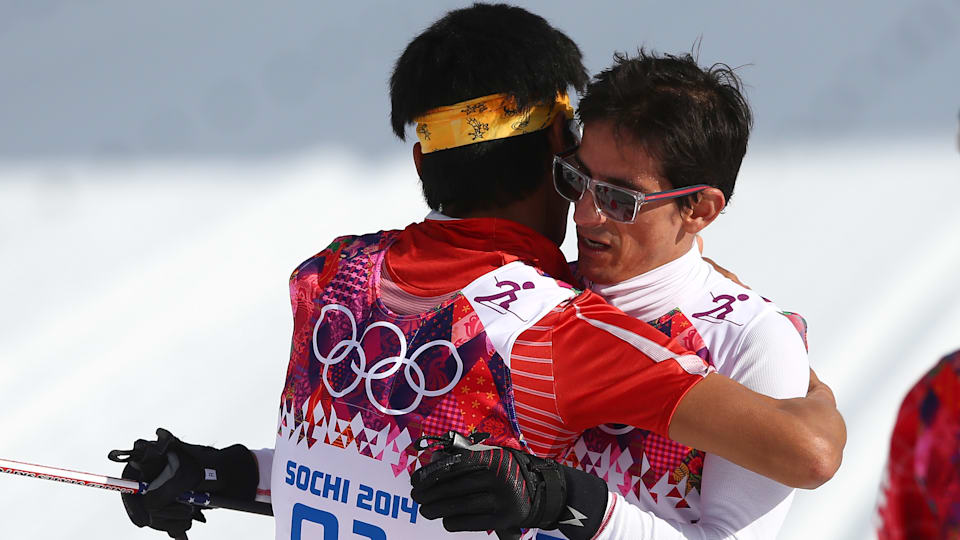When winning isn't everything: The greatest acts of sportsmanship in Winter Olympic Games history
Sometimes, fair play on the field of competition sparkles more than any medal. Here are some amazing examples of sportsmanship in Winter Olympic Games history.

The Olympic Games have a storied history of great acts of sportsmanship between competitors, some of which have meant the difference between an Olympic medal and finishing outside of the podium places.
We look back at some of these iconic moments that have occurred at the Winter Olympics over the years in the spirit of continuing such a fine tradition of fair play and camaraderie at Beijing 2022.
Bjørnar Håkensmoen - Turin 2006
In the women's team sprint cross-country skiing final at Turin 2006, the four powerhouse squads of Norway, Sweden, Finland and Canada were battling for gold.
On the third lap of the six-lap race, Sara Renner (CAN) broke her ski pole and fell from first to fourth. The first person to react was Bjørnar Håkensmoen, the coach of the Norwegian team that had just passed her. Håkensmoen rushed to Renner and handed her his team's spare pole, allowing Renner to remain in the race and enable the Canadians to finish second, while the Norwegian duo of Ella Gjømle and Marit Bjørgen finished fourth.
“The Olympic spirit is the way we try to follow,” Haakensmoen said following the race. “Without that, we are in big trouble. Every skier, every staff member from Norway follows that.
"If you win but don’t help somebody when you should have, what win is that?”
Håkensmoen received universal praise for his act of sportsmanship, while the Norwegian embassy in Canada received over 600 letters, telephone calls and e-mails of thanks. Canadian businessman Michael Page donated 7400 cans of maple syrup to the Norwegian Olympic Committee, and Renner herself sent Håkensmoen a bottle of wine as a token of her gratitude.
Eugenio Monti - Innsbruck 1964
Eugenio Monti (ITA) is the most successful bobsledder in Italian history, and one of the most successful athletes in the history of sport, winning six Olympic medals (two golds), and nine world championships. Yet at the Winter Olympic Games in Innsbruck in 1964, Monti proved that his level of sportsmanship was equal to his skill as an athlete.
At those Games, the British pair of Tony Nash and Robin Dixon had put themselves in contention for the gold medal following their first two runs in the two-man event of the bobsleigh competition. After their third run, however, Nash realised that a bolt on their sled was missing and they didn’t have a spare. Monti lent the bolt from his own sled to the British team. Nash and Dixon would go on to win Great Britain's first bobsleigh gold medal at the Olympic Games, while Monti and his teammate won the bronze.
In response to criticism from Italian media, Monti told them, "Nash didn't win because I gave him the bolt. He won because he had the fastest run."
A few days later, Monti once again demonstrated his exceptional level of generosity when he and his mechanics helped repair the damaged axle of a Canadian sled in the four-man competition. Without Monti's intervention, the Canadian team would have been disqualified. Instead, they went on to win the gold medal, while Monti and the Italian team won bronze. For these acts of sportsmanship, Monti was awarded the Pierre de Coubertin medal - the first athlete to receive such an honour.
Four years later, aged 40, Monti won gold in the two-man and four-man bobsleigh competitions at the 1968 Winter Olympics in Grenoble.
Nao Kodaira - Pyeongchang 2018
The final of the women's 500m speed skating event at PyeongChang 2018 was a big moment for the host country. In South Korea, Lee Sang-Hwa (KOR) was expected to win her third consecutive title in the event following victories in Vancouver (2010) and Sochi (2014). However, Lee's biggest rival for gold, Nao Kodaira (JPN), set a new Olympic record in the previous group to Lee's with a time of 36.94 seconds.
Knowing the time to beat, Lee opened faster than the Japanese but made a mistake on the final turn, finishing with a time of 37.33 to take silver. The pain of missing out on the gold medal in front of her home crowd was clearly evident as Lee performed her lap of honour in tears. But in an act of great sportsmanship, her rival and friend Kodaira joined her on the ice, embracing and comforting her in what is one of the most enduring images of the PyeongChang Winter Olympic Games.
Nao KODAIRA
Dario Cologna - Sochi 2014
Dario Cologna is one of the greatest cross-country skiers in history, with four Olympic gold medals and three World Championship medals to his name**.** But he is also known for his great acts of sportsmanship at Sochi 2014 and PyeongChang 2018.
Cologna won his second Olympic gold medal in the men's 15km classical event in Sochi, and won plaudits after waiting for the final competitor of the field to cross the finish line. Roberto Carcelen (PER) started skiing when he was 35, and became the first Peruvian athlete to participate in the Winter Olympics at Vancouver 2010**.** A few weeks before his second Olympics in Sochi, he injured his ribs during training but decided to compete at the Games against his doctor's advice.
Carcelen finished in last place with a time of 1:06:28.9, almost 28 minutes after Cologna won the event. But as Carcelen crossed the finish line, the Swiss - who was still carrying his skis - greeted the Peruvian and congratulated him. Four years later, Cologna greeted last-placed finisher German Madrazo (MEX) in the same way after winning the 15km freestyle event.
